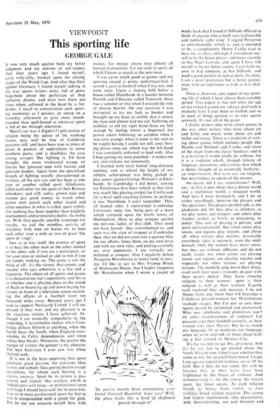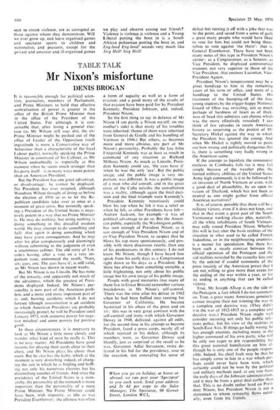VIEWPOINT
This sporting life
GEORGE GALE
It was very much against both my better judgment and my notions of self-respect that four years ago I found myself, quite willy-nilly, hooked upon the closing stages of the World Cup. And after that final against Germany I found myself talking in the way sports writers write, full of gross hyperbole about the perfection of that cathartic drama; and even now there are times when, softened in the head by a few drinks, I recall in conversation such sport- ing memories as I possess, or slump on a Saturday afternoon to gaze more dumb- founded than spell-bound at whatever sport is fed at me through television.
Marx's (or was it Elgels's?) glib notion of religion being the opiate of the working classes may well be true of Calabrian peasants still, and have been true in times of peace in pockets of superstition in more northern parts; and is doubtless the case among savages. But fighting is, I'd have thought, the more traditional escape of literate but ignorant men with literate and ignorant leaders. Apart from the specialised branch of fighting usually characterised as warfare, all the rest can and has been at one time or another called sport. Gladiators killed each other for the sport of their Roman onlookers: and still, today, grown men and women pay good money to watch other grown men punch each other stupid and often senseless in what is called, quite rightly (for nothing has been stupider than knightly tournaments and aristocratic duels). the noble art. With that equally sensible contempt for royalty, we call the mindless activity of watching little men on horses try to beat each other over a mile or two of grass 'the sport of kings'.
Just as in war itself, the essence of sport is to beat the other man or the other animal or tbe other side if you are a participant, or for your man or animal or side to win if you are simply looking on. The game is not the thing at all: it's the victory that counts, and anyone who says otherwise is a liar and a hypocrite. The object of all sports and games is to demonstrate one's superiority, and this is so whether one is playing chess to the sound of Bach or bouncing up and down baying for victory in front of a television screen record- ing the efforts of a football team ten thousand miles away. Because years ago I used to support Newcastle United. I still am pleased if they win; and my pleasure is in the vicarious victory I have achieved. Al- though I am naturally sympathetic to the underdog. I nevertheless rejoice when Cam- bridge defeats Oxford at anything, when the North beats the South, when England over- whelms its Celtic dependencies, and when whites beat blacks. .Moreover, the greater the margin of victory the greater is my pleasure. The best • boat-race I ever saw was when Oxford sank.
It is not in the least surprising that sport generates great passion, for everyone likes to win and nobody likes getting beaten except masochists, for whom each beating is a v.ictory anyway. Sport by its nature is pas- ionate and violent, like warfare. wh;ch is indeed sport writ large—or professional sport writ large I should have said. for in most war- fare-as in most profes•sional sporr the lust to win is confpolinded 'With a treed for gain. But let me not concern myself here with
money, for money enters into alinost all human transactions. Let me stick to sport, of which I know as much as the next man.
I was never much good at games and my sporting record is pretty undistinguished. I scored a goal at football when I was ten, and none since. Upon a sloping field below a house called Hazelbank in a hamlet between Penrith and Ullswater called Yanwath, there was a summer or two when I essayed the role of demon bowler. On one occasion I was instructed to try my luck as hooker and brought up my knee so swiftly that it struck my nose and almost laid me out. Suffering an inability to tell my right hand from my left (except by feeling where a fingernail has grown askew following an accident when I was very young), when it came to my turn to be taught boxing I could not tell, once box- ing gloves were on. which was the left hand
was constantly exhorted to lead with. Also hate getting my nose punched : it makes me cry, and irritates me immensely.
I loathed with total hatred long-distance running, and at school the height of my athletic achievement was being picked to play tennis against George Watson's in Edin- burgh. At Cambridge I did better, rowing for Peterhouse first boat (which at that time was much like playing cricket for Corfu) and for a brief spell coaching Girton, or perhaps it was Newnham, I can't remember. They all looked alike. I represented Cambridge University once, too, being part of a team which ventured upon the lovely lawns of Hurlingham, there to play croquet against the nervous ladies of that club. They need not have feared: they overwhelmed us. and such was, the state of croquet at Cambridge then, that we did not even rate a quarter blue for our efforts. Since them, on my own lawn and with my own rules, and picking carefully my own opponents, I am virtually un- defeated at croquet. Also I regularly defeat Peregrine Worsthorne at tennis (and, in pass- ing. I'd like to say to Mrs Yvonne Brock of Montacute House, that I hadn't forgotten Mr Worsthorne when I wrote a couple of
weeks back that I found it 'difficult offhand to think of anyone who is both very fashionable and publicly right wing'. I regard Peregrine as unfashionable, which is, and is intended to be, a compliment). Henry Fairlie used to beat me at chess although I considered my-
self to be the better player; and more recently so has Nigel Lawson. and again I have felt
myself to be my better enemy. I can hold my own in bad company at bar billiards, and need a good partner to win at darts. In short, I am a poor sportsman but a better games- man, with an experience as wide as it is shal- low.
There is, however, one aspect of my sport- ing life of which I have always been sensibly
proud. This aspect is that not since the age of ten (when I scored my solitary goal with a miskick) have I ever been so foolish and so in need of being opiated as to take sports seriously. It's not all in the game.
I dislike writers who write about games in the way other writers who write about art and ballet and music write about art and ballet and music. There is a tradition of writ- ing about games which includes people like Hazlitt and Newbolt and Cardus and some of the chaps from the classy Sundays; and it is a tradition I would gladly do without, for it is a tradition which, through felicity of language, glamorises and civilises that which is better thought of as essentially barbaric: an improvement, that is to say, on religion, but nevertheless an opiate of the masses.
An opiate, did I say, soporiferous? Well, yes: in that it puts them into a dream world and a nightmare world, a drugged world.
And here I must distinguish, and I do so rather unwillingly, between the players and
the spectators. The players do their job, as the gladiators did. Or they play as children, as we play tennis and croquet, and others play Sunday cricket, or bowls, or ping-pong, or poker. This sort of playing is private, and quite unexceptionable. But when towns play towns, and regions play regions, and above all, when nations play nations, practically everybody takes it seriously, even the intel- lectuals. Only the women have more sense; but they are without influence and do not really count, not when towns are playing towns and regions are playing regions and especially not when nations are playing nations. The menfolk gulp down their drugs, exult with their team's triumph. despair with their team's defeat. They leave churchy religion to their women: sport is their
religion as well as their warfare. Eagerly each weekend they seek narcosis. I do not blame them, any more than I'd begrudge a Calabrian peasant-woman her Mariolatrous roadside images. But I'm not so sure their .
sports should be celebrated and glamorised. Who now celebrates and glamorises war?
Or other manifestations of violence? Let peasants take their football seriously, as their women take their Masses. But let us watch our language, let us moderate our language, when we write and talk of those chaps kick- ing a ball around in Mexico City.
Its far too late to say this, of course. And it's far too late to get excited about the South African tour. I don't care whether they come or not, for, as you'll have noted, I hope, I am against organised violence, on or off the
field. But if they do not come, this will be because they or their hosts have been frightened by the threat of violence. And
demonstrating is. for the young, the newest sport, the latest opiate. As each religion breeds its heresy from within, so does
violence 'breed. violent reaction. The young ind violent reactionaries who demonstrate, and, demonstrating, use and threaten and
seek to create violence, are as corrupted as those against whom they demonstrate. Will we ever grow up, and leave organised games and spectator sports to children and nationalists and peasants, except for the private and amateur and ill-organised games
we play and observe among our friends? Violence is violence is violence and a Young Liberal putting the boot in is a South African policeman putting the boot in, and Eng-land Eng-land! sounds very much like Sieg Heil! Sieg Heil!



































 Previous page
Previous page